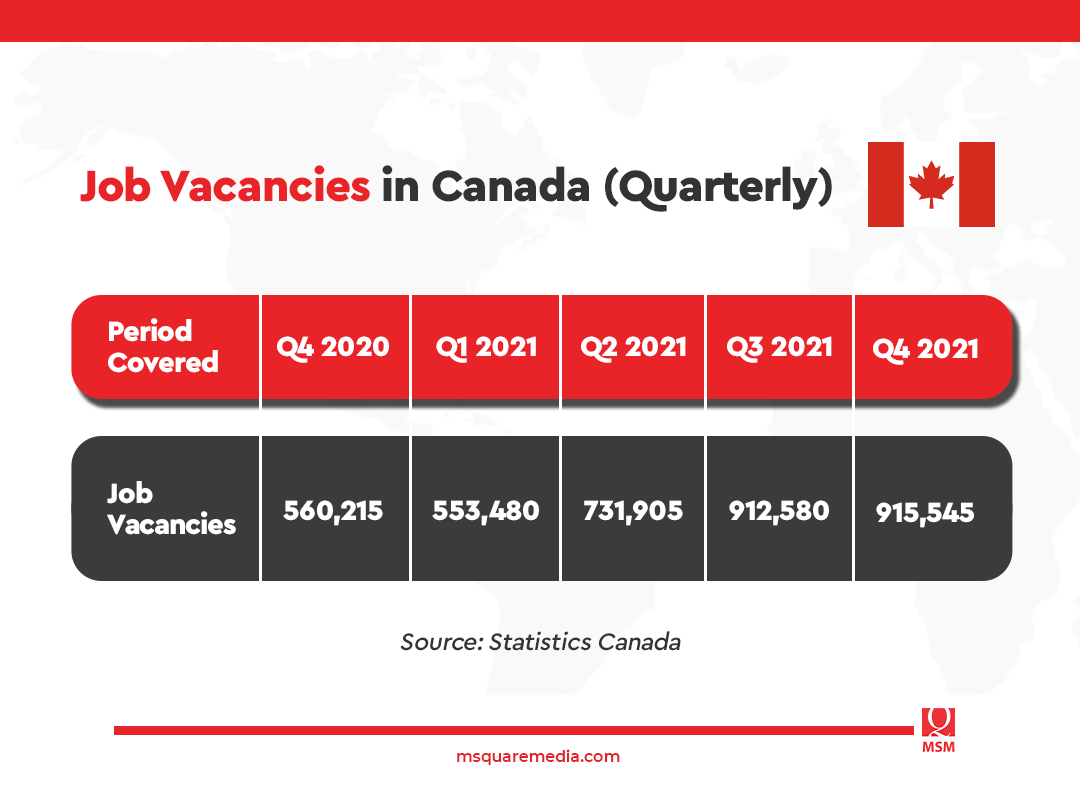Canada has a labor shortage issue, and the pandemic has added to the struggle of businesses in the area when it comes to hiring skilled workers.
Key Points at a Glance
- Canada is experiencing a labor shortage problem
- Fifty-five percent of Canadian entrepreneurs are “struggling to hire the workers they need,” according to the Business Development Bank of Canada.
- Sectors affected most by the labor shortage problem include hospitality, health care, construction, manufacturing, retail trade and trucking.
- Canada issued 354,000 study permits for international students within the first nine months of 2021, signaling an aggressive pro-migration stance.
Challenges
The Canadian workforce, presumably along with millions of others all over the world, underwent a collective rattling in light of the COVID-19 pandemic. Some industry experts have dubbed it “The Great Resignation,” a term inspired by the economic events that started in the United States in the late 1920s leading to the 1930s.
There were people who chose early retirement. There were others who decided to work from their homes instead of reporting to the office. There were individuals who thought that it was the perfect time to change careers.
All these, in light of Canada’s skills gap and labor shortage problem, spell anxiety and uncertainty for Canadian businesses.
According to the results of a survey done by the Business Development Bank of Canada (BDC), “55 percent of Canadian entrepreneurs are struggling to hire the workers they need, which leaves them with no choice but to work more hours, as well as delay or refuse orders.”
The BDC also added that more than 25 percent of Canadian businesses are having a hard time retaining employees.
An online article by the CBC published earlier this year, noted how people leaving (or have been let go of) their jobs is impacting other industries like travel, tourism and hospitality.
“The result is rising worker absences, prompting airlines to cancel flights, drugstores to close early and restaurants to move to takeout only,” stated the article.
Industries
In terms of labor shortages expedited by the impacts of COVID-19, some of the top affected sectors in Canada include hospitality, health care, construction, manufacturing, retail trade, and trucking. These were highlighted in a report by Statistics Canada.

According to the report, job vacancies in the hospitality and food service industries hit 89,100 in 2021. Job vacancies in retail trade 84,300 the same year. The manufacturing sector logged in 65,900 vacancies. In construction, vacancies were at 62,600. As for the healthcare industry, Statistics Canada reported 731,900 job vacancies in 2021. A report by Trucking HR Canada stated that the country had an average of 18,000 truck driver positions in 2021.
Job vacancies are a national problem but the COVID-19 pandemic has not only shed light on them but pushed them to all-time highs. In the first quarter of 2021, there were a reported 553,480 job vacancies. In the second quarter, it rose to 731,905. Come the third quarter, job vacancies in Canada were at 912,580 and this number rose to 915,543 by the last quarter of 2021.
Students
History has shown that one way the nation’s labor shortage issue can be solved is through international students who choose to be engaged with the labor market.
In a social and economic report published earlier this year, the authors revisited the data of international students who held a Post-Graduation Work Permit (PGWP) and how many of them became permanent residents within five years of having obtained their PGWP. The answer? Almost 3/4 of all PGWP holders transitioned to becoming permanent residents.
The report deduced that increasing numbers of international students also meant increasing numbers of people who have engaged in the Canadian labor market. Through participation in the PGWP program, international students have been a growing and steady source for the Canadian labor market, and they are expected to continue well beyond their years in school.
The national government is well aware of this: In 2021, Canada welcomed back a good number of international students, issuing 354,000 study permits within the first three quarters. International students alone help sustain over 170,000 jobs, while contributing about $22 billion to the economy.
Conclusion
In 2020, the country allowed online study for PGWP eligibility. Currently, this was extended until the middle of 2022. While the move served its purpose—and has done so exceedingly well—slowly rebounding from the pandemic would also mean that the government and stakeholders in the international education community find a way to allow students to pursue their education in Canada instead of from their home countries.
From the perspective of international education and its immediate impact in both the urban and rural economies of Canada, it has now become imperative for a top destination market to focus its efforts in attracting the most skilled and talented international students in the coming years. (DONNA HOOKER)

Donna Hooker
President, MSM Higher Ed
Donna has worked in the international education field for 30 years. She has a comprehensive knowledge of policy and practice in the public post-secondary education system in British Columbia, Canada and worldwide. She is a past board chair for the BC Centre for International Education and has held senior management roles at BC Institute for Technology, Vancouver Community College, and most recently at Capilano University.
Donna has demonstrated excellence in leadership with a focus on international education and services marketing, as well as in her role as interim Dean of Business for three years at Vancouver Community College. Donna holds an MBA with a strategic focus on Services Marketing and International Education and has facilitated the professional development of others by teaching general business and service marketing in Canada as well as internationally. Donna joined M Square Media as President after having had an excellent first-hand experience as an MSM client.

